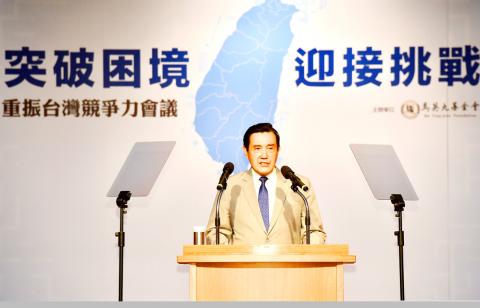Former president Ma Ying-jeou (馬英九) yesterday called the Democratic Progressive Party (DPP) and participants of the Sunflower movement “sinners” for damaging Taiwan’s economy.
He said that under their blind obstruction, the Cross-Strait Service Trade Agreement fell through.
The agreement and other proposals he made were prioritized around Taiwan and beneficial for the public, but the DPP, with its anti-China sentiment, “opposed [them] for the sake of opposing,” he said at a conference held by the Ma Ying-jeou Foundation in Taipei, adding that the agreement was a lost opportunity.

Photo: Huang Yao-cheng, Taipei Times
During his eight years in office, the number of births defied expectations and increased by 15,000 per year, while last year, there were only 181,000 births, he said.
The national birthrate is low, yet President Tsai Ing-wen (蔡英文) says Taiwan’s economy is the best it has been in 20 years, he said, adding that Tsai “feels good about [herself], but the people feel bad.”
Hon Hai Precision Industry Co (鴻海精密) chairman Terry Gou (郭台銘), a Chinese Nationalist Party (KMT) presidential hopeful who spoke at the conference, said that his motivation to run for president is to help the younger generation.
Young people around the world are facing a number of challenges, but while many people only see their anger, he sees their despair and dejection, he said, adding that the government is allowing them to just “sit around and wait.”
Responding to Ma’s comments, New Power Party Legislator Huang Kuo-chang (黃國昌) said on Facebook that the low salaries and high housing prices caused by the Ma administration’s “incorrect policies” were the “real sinners” for depriving the younger generation of a future.
Taiwan’s GDP rose 30.6 percent from NT$13.15 trillion to NT$17.18 trillion (US$425.5 billion to US$555.9 billion) during Ma’s presidency from 2008 to 2016, Huang wrote.
The average monthly wage during that period rose from NT$36,383 to NT$39,213, at a rate of “only 7.7 percent, far lower than the GDP growth rate,” Huang said.
If inflation is taken into consideration, then real wages were nearly stagnant, he added.
Tsai said it was irresponsible of Ma to blame the Sunflower movement and the DPP for the poor economy.
Ma’s comments “erased” the efforts of Tsai’s government and the public over the past three years, the National Development Council said.

NATIONAL SECURITY THREAT: An official said that Guan Guan’s comments had gone beyond the threshold of free speech, as she advocated for the destruction of the ROC China-born media influencer Guan Guan’s (關關) residency permit has been revoked for repeatedly posting pro-China content that threatens national security, the National Immigration Agency said yesterday. Guan Guan has said many controversial things in her videos posted to Douyin (抖音), including “the red flag will soon be painted all over Taiwan” and “Taiwan is an inseparable part of China,” while expressing hope for expedited “reunification.” The agency received multiple reports alleging that Guan Guan had advocated for armed reunification last year. After investigating, the agency last month issued a notice requiring her to appear and account for her actions. Guan Guan appeared as required,

Japan and the Philippines yesterday signed a defense pact that would allow the tax-free provision of ammunition, fuel, food and other necessities when their forces stage joint training to boost deterrence against China’s growing aggression in the region and to bolster their preparation for natural disasters. Japan has faced increasing political, trade and security tensions with China, which was angered by Japanese Prime Minister Sanae Takaichi’s remark that a Chinese attack on Taiwan would be a survival-threatening situation for Japan, triggering a military response. Japan and the Philippines have also had separate territorial conflicts with Beijing in the East and South China

A strong cold air mass is expected to arrive tonight, bringing a change in weather and a drop in temperature, the Central Weather Administration (CWA) said. The coldest time would be early on Thursday morning, with temperatures in some areas dipping as low as 8°C, it said. Daytime highs yesterday were 22°C to 24°C in northern and eastern Taiwan, and about 25°C to 28°C in the central and southern regions, it said. However, nighttime lows would dip to about 15°C to 16°C in central and northern Taiwan as well as the northeast, and 17°C to 19°C elsewhere, it said. Tropical Storm Nokaen, currently

PAPERS, PLEASE: The gang exploited the high value of the passports, selling them at inflated prices to Chinese buyers, who would treat them as ‘invisibility cloaks’ The Yilan District Court has handed four members of a syndicate prison terms ranging from one year and two months to two years and two months for their involvement in a scheme to purchase Taiwanese passports and resell them abroad at a massive markup. A Chinese human smuggling syndicate purchased Taiwanese passports through local criminal networks, exploiting the passports’ visa-free travel privileges to turn a profit of more than 20 times the original price, the court said. Such criminal organizations enable people to impersonate Taiwanese when entering and exiting Taiwan and other countries, undermining social order and the credibility of the nation’s